St Bede’s College Centenary
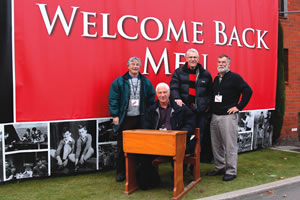 Pentecost Sunday 27 May 2012.
Pentecost Sunday 27 May 2012.
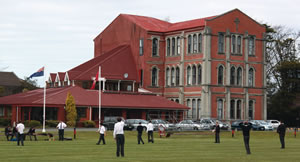 On the fiftieth day after the Resurrection of Jesus the apostles met together. They had been waiting for all those days and nothing much had happened to them. They had seen Jesus. They had touched him, they had eaten with him. They had seen him again, they had seen him leaving, they had been sent to Jerusalem by a couple of angels, but to them, themselves, nothing had happened.
On the fiftieth day after the Resurrection of Jesus the apostles met together. They had been waiting for all those days and nothing much had happened to them. They had seen Jesus. They had touched him, they had eaten with him. They had seen him again, they had seen him leaving, they had been sent to Jerusalem by a couple of angels, but to them, themselves, nothing had happened.
They hoped that something would happen.But right then, on that fiftieth day, it was an hiatus in time - and they were right in the middle of it.
Now, as we celebrate this Pentecost day, gathered here in our common heritage at St Bede’s College, one hundred and one years on from 1911, I wonder if we, too, stand in an hiatus of time. A celebration postponed because of what has happened, anxiety still at what might happen, knowledge, and conviction even, that something has to happen. An hiatus in time. A need for a helper, a consoler, and advocate. A waiting on the Spirit.
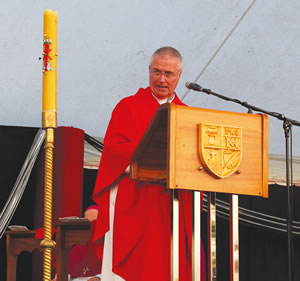
Fr Mark Walls sm
Part of our reason for gathering has been to look back. We have been assisted in that by David McCarthy’s Faith of our Fathers – a monumental work and a monumental tribute to the trials and the triumphs and the tragedies of our history. We have talked to each other and reminisced. We have laughed and wondered at our previous boldness, and been saddened by those who could or would not join us. We are proud that, at least in some small way, St Bede’s is how it is because we were here. Now we gather around the table of the Eucharist, at the pinnacle of our celebrations, and we thank God for the faith of our fathers, we ask forgiveness for the sins of our fathers, and we call on the Spirit now to nudge us forward from this hiatus in time.
Jesus had told the apostles that he was going to send them a helper, so that meant they would have to do things, and they were not too sure that they liked the idea. He had told them that he was going to send them a consoler, which obviously meant that they were going to suffer, because only one who suffers needs a consoler and consolation.
He had spoken about light; he had spoken about fire; he had been speaking about doing greater things than he had done, about moving mountains, about being led to where they would rather not go, about going out to all nations, about going to the ends of the earth, about breaking your bread and sharing your cup, about laying down your life for your friends, and things like that. And to tell the full truth, when they thought about it they did not like it, and the more they thought about it the less they liked it. They hoped, I think, that the fiftieth day would pass without any extra fuss, without any further possibilities, or things like that.
But they did meet. They kept their appointment. And there they were discussing and asking each other: “What are you going to do if nothing happens?”……telling each other bravely that even if nothing happened anymore, they nevertheless did not regret the time they had been with Jesus. That’s the sort of thing said by people stuck in an hiatus in time.
But we know that suddenly it did happen. Heaven opened and there was noise, and fire, a large flame that divided into smaller ones. And then the very thing they had been most afraid of took place: the Spirit didn’t nudge them forward from the hiatus in time --- the Spirit propelled them, a newness overtook them, and the apostles became not only capable of speaking all kinds of languages, but they were willing to use those languages to speak to people to whom they never would have dreamed of speaking before. And the newness came not when they received the power to forgive sins, but at the moment that they did forgive each other, at the moment that they did not relate to one another any more as competitors and enemies, as rivals and contestants, but as part of one humanity embracing the future. And for a while anyway, they became like him and broke their bread and shared their cup, just like he did.
And still, at the beginning of a new century, just as he did and just as they did, we meet and break our bread and share our cup. We do this to remember, but we remember so that we can have the grace and the courage and the generosity to create more memories, to open our hearts now to the same compelling Spirit to fill us with the holy enthusiasm of a new beginning. Our centenary year lowered the curtain on one hundred years in a dramatic fashion. Any temptation to pride or conceit in our achievements was purged away, and
we were reminded in the most robust of fashions that this work at St Bede’s is God’s work and the work of Mary his Mother after whom we are called Marist.
We are their instruments, their hands and their feet, and if we are now to move forward from this hiatus in time, then we do so in faith, open to the Spirit of that first Pentecost.
So now let us raise the curtain again in hope. When a new history is written at some future moment, the courage and resolve and resilience of this generation of staff and students will win appropriate acclaim. That is the same Spirit at work, the same Spirit that filled the apostles at the first Pentecost with such daring and insight, that same Spirit that is right now among us at this Pentecost speaking to us in the language of the people and events of our lives. May we have the courage to listen, to hear, and to be similarly charged with hope as we plot the future of our college and indeed the future of our diocese of Christchurch.
With the apostles at Pentecost, says the Book of Acts, joined in continuous prayer, were several women, including Mary, the Mother of Jesus. This college was founded on the principles of Marist education and as it reaches this point in its history, this moment of new beginning, let these principles continue to be our blessing. We are invited to work in the way Mary did:
- to welcome everything without seeking to understand everything
- to welcome everything except that which prevents growth
- to store questions in a wait-and-see expectation, not as a sack of problems
- to retain from the past only what bore fruit
- to consent to what is
- to want for the future only what God wants for each one
- to be present but not omnipresent
- to relate to our students with the patience and impatience of the farmer with his or her crops
- to allow that all may be done as God wishes it to be done, using our hands and our feet, our hearts and our faith.
Let us go forward, by faith, and by work. Fide et Opere.
Report from the Centennial Organising Committee
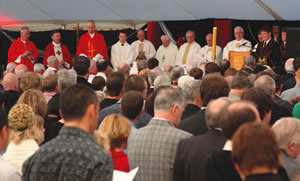
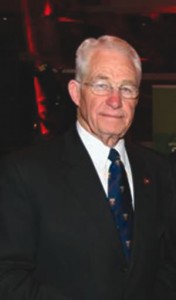
by Robin Mann
Our Centennial celebration was four years in the planning, delayed for a year because of the earthquakes, but the outcome was a fabulous occasion.
The Centennial Committee set out some clear objectives on what it wanted to achieve. I am pleased to say that our expectations were more than fully met.
The feedback has been overwhelming and unanimously positive. The comprehensive plan was magnificently organised and executed by the College staff with the assistance of our very professional main suppliers, the Conference Company and Continental Caterers.
The Bedean community turned out in force and revelled in recalling and recounting their memories of the past. The College as it is today was showcased for us by the Rector and his staff. The students demonstrated the quality of their education and their development into fine, well educated, multi-talented young men. It made us proud to be Bedeans.
The ceremonial Masses were a highlight; our speakers did us proud, recalling the past with respect and humour. We were well entertained.
If the support demonstrated at this centennial celebration is anything to go by St Bede’s has a very bright future.
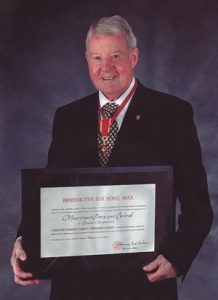
Prominent Old Boy:
Maurice Boland (1948 - 1952 )Awarded NZ Order of Merit 2005 ;
Papal Knighthood 28 April,2012
 Entries(RSS)
Entries(RSS)